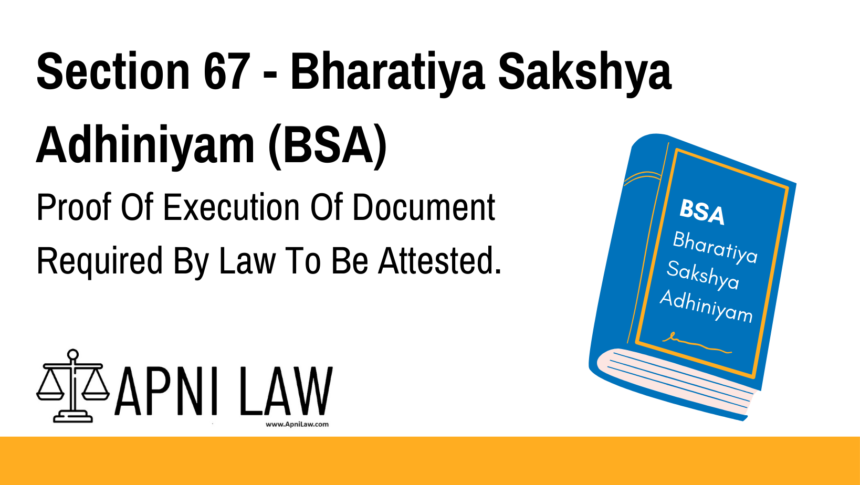Code: Section 67 – Bharatiya Sakshya Adhiniyam, 2023 (BSA)
If a document is required by law to be attested, it shall not be used as evidence
until one attesting witness at least has been called for the purpose of proving its execution,
if there be an attesting witness alive, and subject to the process of the Court and capable of
giving evidence:
Provided that it shall not be necessary to call an attesting witness in proof of the
execution of any document, not being a will, which has been registered in accordance with
the provisions of the Indian Registration Act, 1908, unless its execution by the person by
whom it purports to have been executed is specifically denied.
Explanation of Section 67 BSA
Section 67 of the Bharatiya Sakshya Adhiniyam (BSA) lays down the rules for proving the execution of documents that are legally required to be attested. According to this section:
-
If a document must be attested by law (e.g., wills, mortgages), it cannot be used as evidence in court unless at least one attesting witness is called to prove that the person actually signed or executed the document.
-
This requirement applies only if an attesting witness is alive, capable of giving evidence, and can be summoned by the court.
-
However, there is an important exception: if the document (other than a will) has been registered under the Indian Registration Act, 1908, it is not necessary to call an attesting witness unless the execution of the document is specifically denied.
This provision balances evidentiary authenticity with procedural efficiency, especially in the case of registered documents.
Illustration
Example 1: Will Requiring Attestation
A person presents a will in court that was required by law to be attested. Even though the will is registered, since it is a will, at least one attesting witness must be called to prove its execution.
Example 2: Registered Sale Deed
A registered sale deed for a property is submitted as evidence. Since it has been properly registered under the Indian Registration Act, 1908, it is not necessary to call an attesting witness unless the opposing party specifically denies that the person signed or executed the deed.
Common Questions and Answers on Section 67 BSA
1. What is meant by an “attested” document?
An attested document is one that has been signed by witnesses confirming that they saw the document being executed (signed) by the relevant parties.
2. Is an attesting witness always required in court?
No. An attesting witness is required only when the law mandates attestation and when the document is not excluded by the exception in Section 67.
3. Does registration of a document eliminate the need for an attesting witness?
Yes, but only in certain cases. If the document is not a will and has been registered under the Indian Registration Act, 1908, then an attesting witness is not required—unless the execution is specifically denied.
4. What if all attesting witnesses are dead or unavailable?
If all attesting witnesses are deceased or cannot be found, then the execution of the document can be proved by other means under the provisions of the Bharatiya Sakshya Adhiniyam.
5. Why are wills treated differently?
Wills are subject to stricter scrutiny due to the potential for fraud or undue influence. Therefore, even a registered will must be proved by calling at least one attesting witness.
Conclusion
Section 67 of the Bharatiya Sakshya Adhiniyam ensures that documents required by law to be attested are properly proved before being admitted as evidence in court. This section upholds the reliability of documentary evidence while also providing flexibility in the case of registered documents. Legal practitioners and parties must be cautious to comply with these requirements to avoid rejection of important documents during litigation.
For more insights into the Bharatiya Sakshya Adhiniyam and document-related legal procedures, visit ApniLaw.








